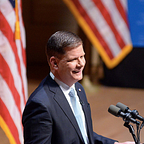As new Chair of the U.S. Climate Mayors, I’m ready to bring the climate leadership of America’s cities to the national level
Last week, I became Chair of the U.S. Climate Mayors, a national coalition of more than 450 American cities that are taking bold action to fight climate change. On Tuesday, November 17, I participated in a national conversation with my fellow Climate Mayor Latoya Cantrell of New Orleans, and Director of the World Resources Institute, Dan Lashof. We discussed the ways in which climate change is already impacting people in our cities, and the most immediate steps the United States must take in order to prevent irreversible damage to our planet.
A recording of the conversation is available here.
Read on for a summary of my remarks.
Everything we want to accomplish right now — public health, public safety, racial justice, and a strong, equitable recovery from COVID-19 — all depends on a healthy environment. Climate action is the foundation for everything else we care about.
In the last few years, raging wildfires on the west coast, catastrophic hurricanes in the southeast, and historic flooding and heat waves in New England have brought the devastation of climate change to our doorsteps. The facts are clear: we have less than ten years to act on climate, and prevent irreversible damage to our planet. It’s up to us, right now, to act with urgency and courage.
Here in Boston, we’ve taken this responsibility seriously: by cutting emissions, investing in green jobs, preparing our coastline for sea level rise, and planning ahead to protect our most vulnerable populations from climate impacts. That’s what a strong city does.
And we’re not alone: we’ve banded together with cities all over the country to stand up for what’s right and protect the future of our country and our world. One of the coalitions leading this work is the Climate Mayors, representing a coalition of more than 450 cities nationwide.
As Mayors, we’re close to the people we serve. We see first-hand how climate change is already impacting people in our communities. And we see an enormous opportunity, right now, to create a healthier, safer, and more prosperous world through climate action.
I’ve been proud to do this work alongside my fellow American mayors, especially over the last four years when we didn’t have climate leadership at the national level. And now, as we welcome a Biden-Harris administration that is committed to climate action, we’re ready to take our work to the next level, and I’m honored to lead this effort as Chair.
President-elect Biden and Vice-President elect Harris have already made it clear that climate will be a major priority for their administration. They’ve committed to re-entering the Paris Agreement, strengthening our energy standards, and investing in green jobs in all 50 states. The new administration is ready to do all of these things, and the Climate Mayors are ready to support them.
It is increasingly clear that climate action needs to be essential to our national COVID-19 recovery efforts. COVID-19 has exposed and worsened many of our society’s vulnerabilities and inequalities. The pandemic has shown us how many Americans are one missed paycheck away from eviction; and how much health outcomes vary depending on the color of your skin. People of color, immigrants, low-income communities, and people with pre-existing health conditions are being hit the hardest. These are the same populations who are most vulnerable to the impacts of climate change, including heat waves, coastal flooding, and power disruptions.
That’s why climate change is not just an environmental issue. It’s a public health issue. It’s a public safety issue. It’s a human rights issue. And it’s certainly a racial justice issue. We need to recognize all the ways that historic, systemic racism has profound and devastating impacts on people’s health, wellbeing, and survival. And our long-term recovery from COVID-19 must be rooted in environmental and racial justice.
Here’s one example of what that looks like. In Boston, we’re developing a Carbon Emissions Standard to reduce emissions from our largest buildings. This will include construction projects to retrofit old buildings and make them more energy efficient. This is an opportunity to create more training opportunities and jobs for people of color. We’re making sure that the populations most impacted by climate change benefit from the green jobs we create.
There is so much opportunity to bring these same ideas to the national level. The United States desperately needs a national commitment to upgrading our outdated infrastructure. That is a huge opportunity to create hundreds of thousands of jobs building green, resilient infrastructure, while drawing on the incredible talent and innovation of the American people to create long term, sustainable solutions.
The opportunities are endless, if we work together as a nation toward a green and equitable recovery. One of the greatest things about the Climate Mayors is the diversity of our membership and the people we represent. We are going to highlight the wealth of innovations already happening across America’s cities, including creative ways to cut emissions, and bold solutions to protect people from heat, drought, and storms. We’re going to make sure that our residents’ voices are heard. And we’re going to embrace the challenges that lie ahead as an unprecedented opportunity to create a healthier, more sustainable, and more equitable future. Now is the time to heal our nation, by investing in long-term community health and wellbeing. And climate action is at the heart of that work.
To learn more about the City of Boston’s commitment to fighting climate change, visit Boston.gov/Environment.
To learn more about the Climate Mayors, visit ClimateMayors.org
